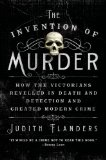Summary | Excerpt | Reviews | Beyond the Book | Readalikes | Genres & Themes | Author Bio

How the Victorians Revelled in Death and Detection and Created Modern Crime
by Judith Flanders
After John Williams' suicide, the authorities wanted to show that death would not permit the supposed murderer to escape justice. His body was placed on a cart with the murder weapons and brought to stand in front of his victims' houses, watched by the local community.
Williams was to cast a longer shadow on the mental attitudes to crime and crime prevention in the nineteenth century than his skeletal remains could do physically. His ghost made several appearances in Parliament in the months that followed his death. The government was slower than the public to embrace the solution of Williams as the sole murderer. In a debate, the radical MP William Smith simply assumed that the crimes had been committed by 'a gang of villains, of whom few or no traces had yet been discovered'. The Prime Minister, Spencer Perceval, agreed with him.* The case 'was still wrapped up in mystery. It undoubtedly seemed strange that a single individual could commit such accumulated violence.'
It was not the mystery that troubled the politicians; it was that policing throughout London was now seen to be completely inadequate. The city was still eighteen years away from establishing a centralized police force, and relied on a patchwork of overlapping organizations that had developed independently. By 1780 there were 800,000 inhabitants living in London's two hundred parishes, which were responsible for the watch and policing, and also for lighting, waste disposal, street maintenance and care of the poor. But nothing was straightforward: Lambeth parish had nine trusts responsible for street lighting, St Pancras eighteen for paving; by 1800 there were fifty London trusts charged with maintaining the turnpike roads alone. In 1790, a thousand parish watchmen and constables were employed by seventy separate trusts. And even twenty years before that, in a city that was then much smaller, Sir John Fielding, the famous Bow Street magistrate, had warned Parliament that 'the Watch … is in every Parish under the Direction of a separate Commission', which left 'the Frontiers of each Parish in a confused State, for that where one side of a street lies in one Parish, the Watchmen of one Side cannot lend any Assistance to [a] Person on the other Side, other than as a private Person, except in cases of Felony'.
In 1792, in a preliminary attempt to rationalize this motley collection of responsibilities, the Middlesex Justice Bill was passed, creating seven metropolitan police offices, each to be staffed by three magistrates and six constables, with at least one magistrate in each of the offices having legal qualifications (previously magistrates had simply been men of a certain status and level of wealth). In 1798 a privately funded force was set up to police the river and docks, paid for by the local West Indies merchants. In 1800 this force was taken over by the magistrates, and named the Thames River Police, with its own magistrate, Patrick Colquhoun.
By the end of the eighteenth century, with the population of London approaching a million, crime prevention was the responsibility of fifty constables and eight Runners at Bow Street magistrates' court and the seven police offices, plus a thousand additional constables and two night-time Bow Street patrols of 122 men. There were also 2,000 parish watchmen, who covered the 8,000 streets of London after dark. Some indication of the attitudes towards these two groups of men can be seen from their pay. The Bow Street patrols were paid between 17s.6d. and 28s. a week; by contrast, many watchmen received a beggarly 4s.11d. Colquhoun commented on the contempt that was shown these forces: 'It is an honourable profession to repel by force the enemies of the state. Why should it not be equally so to resist and to conquer these domestic invaders of property, and destroyers of lives who are constantly in a state of criminal warfare?'
From Invention of Murder by Judith Flanders. Copyright © 2013 by the author and reprinted by permission of St. Martin's Press, LLC
He has only half learned the art of reading who has not added to it the more refined art of skipping and skimming
Click Here to find out who said this, as well as discovering other famous literary quotes!
Your guide toexceptional books
BookBrowse seeks out and recommends the best in contemporary fiction and nonfiction—books that not only engage and entertain but also deepen our understanding of ourselves and the world around us.